Japan and South Korea are now working to improve their relationship, and the two countries have held six summit meetings in the six months that have passed since ROK President Yoon Suk Yeol visited Japan in March. The number of visitors between countries has also begun to rise with the sharp decline in COVID-19 infections.
We wanted to determine how people in each country view the government-led easing of the relationship between Japan and South Korea since President Yoon's March visit.
This past October 8 marked the 25th anniversary of the Japan-Republic of Korea Joint Declaration, a declaration made to confirm that both countries will work towards building a new partnership between them. This year's public opinion survey was designed to determine how people in both countries feel about such efforts at this time.
The relationship between the two countries has improved dramatically over the last six months, and public opinion in both countries has changed immensely, but this survey made it clear that there remains a major difference in awareness - public opinion in South Korea has not improved as much as it has in Japan.
We will use the data to analyze this issue to the greatest extent possible.
Why has public opinion in South Korea not improved as dramatically as it has in Japan?
First, we will evaluate the current Japan-South Korea relationship. The percentage of Japanese respondents who view the relationship as poor was 21.2%, its lowest level since 2013 and a major improvement over the 39.8% recorded in last year's survey.
The percentage of Japanese respondents who see the relationship as good has more than doubled from 13.7% last year's to 29%. This survey was the first time that more Japanese respondents view the relationship as good than as poor.
South Korean respondents viewing the relationship as poor also showed a large decline, from 64.6% last year to 42% this year, marking the first time this number has dropped below 50%.
South Korean respondents who view the relationship as good was also the highest ever in the history of the survey, up from 4.9% last year, but it still only reached 12.7%. Those selecting "Neither" (good or bad) rose dramatically from 29.7% last year to 43.1% this year, perhaps as many people are still not convinced that the relationship has improved.
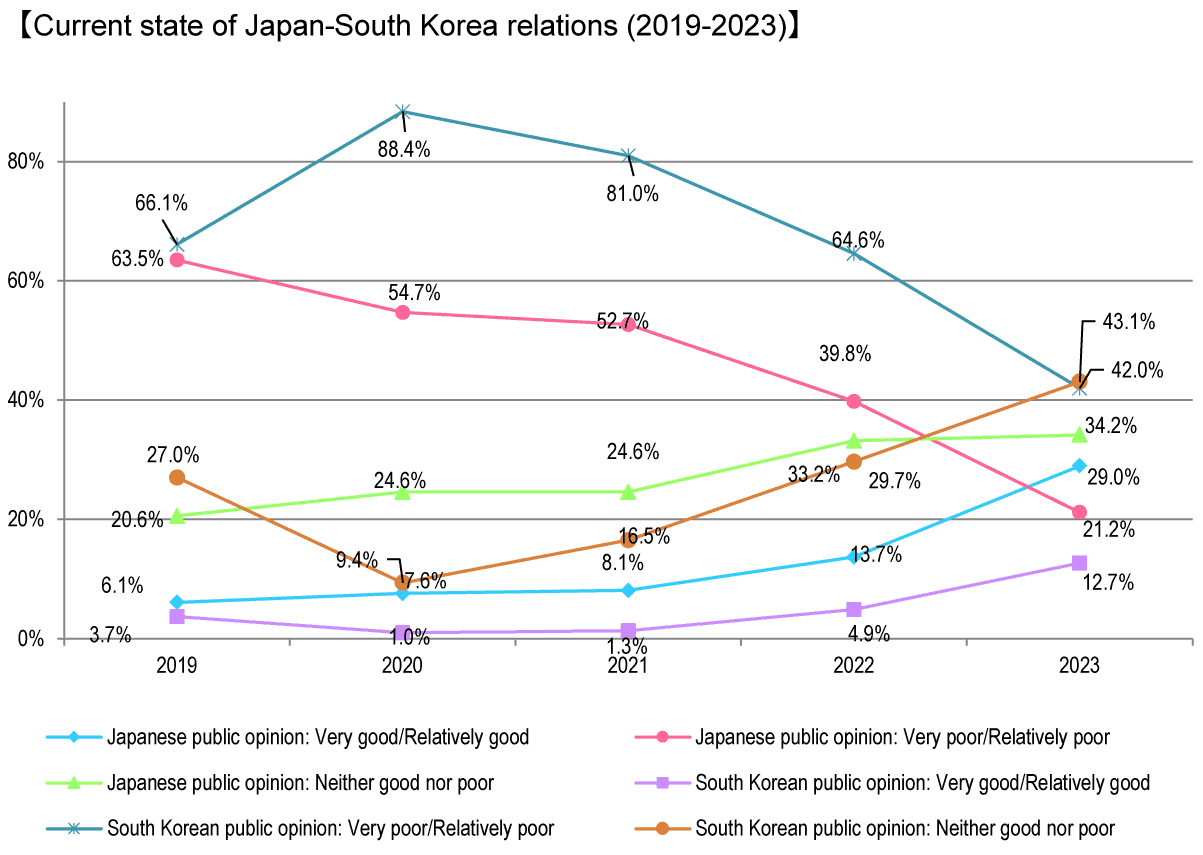
Japanese expectations for the Japan-South Korea relationship are rising, with 38.5% believing that it will continue to improve, over 29.9% last year, a significantly higher percentage than those who believe it will deteriorate, which stood at 7.8%.
However, South Korean respondents were not as optimistic in their outlook. Opinion was divided, with a total of 28.8% of South Korean respondents feeling that the relationship will improve, and 18.2% feeling that it will worsen.
Meanwhile, while Japanese impressions of South Korea have risen considerably, South Korean impressions of Japan are yet to improve.
Japanese respondents with a good impression of South Korea rose from 30.4% last year to 37.4%, while those with a poor impressions dropped from 40.3% to 32.8%. This is another metric in which "good" outweighed "bad" in Japan for the first time since the survey began.
In contrast, 53.3% of South Koreans still have a poor impression of Japan, almost the same as last year's 52.8%. Those with a good impression stood at 28.9%, a slight drop from last year's 30.4%.
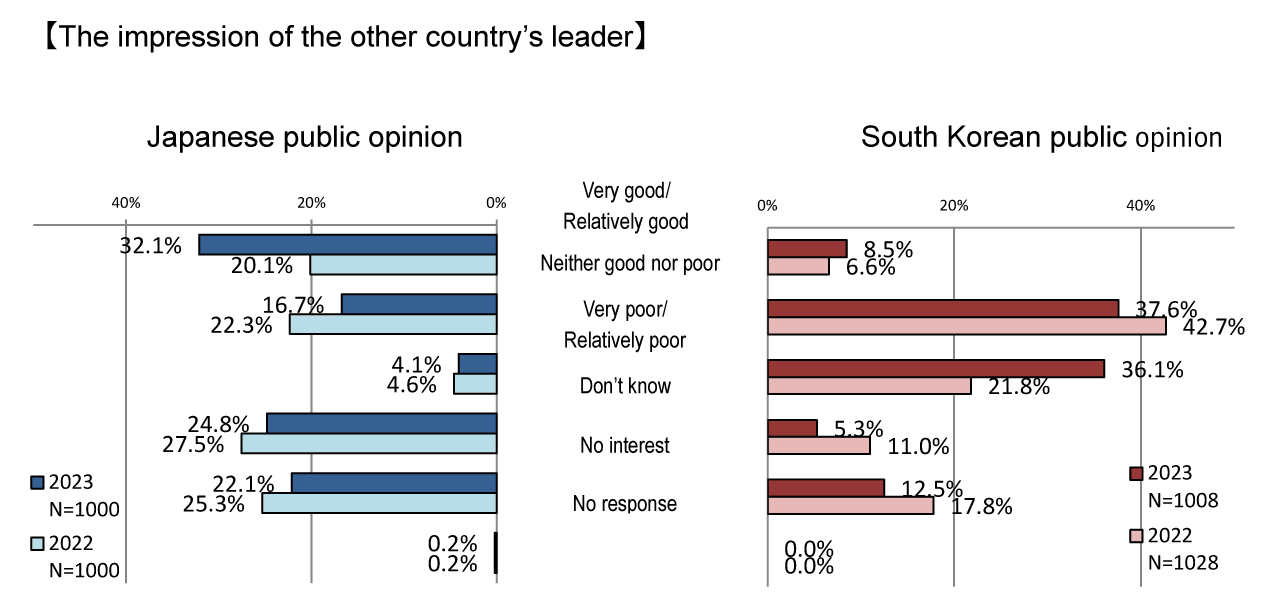
In order to understand this difference in public opinion, we must first understand that private-sector exchange has yet to recover from the COVID-19 pandemic, and that any improvement yet achieved has been due to efforts made by the leaders of the two countries. In addition, we must remember that the citizens of neither country are involved with any of these efforts or interactions, and that the inhabitants of both countries still do not understand the motives behind the actions of either leader.
Visits between the two countries have continued to increase, with more than 4.32 million South Koreans visiting Japan in the first half of the year. However, it has been less than a full year since Japan began allowing visitors again (as of the time of the survey), so this increase in visitors has yet to have a positive effect on public opinion in South Korea. The same could be said for public opinion in Japan.
Travelling to other countries can greatly help improve people's impressions of those countries, but without sufficient interaction and exchange, we cannot expect much in terms of improvement, and people's perceptions of the other country will depend on how that country is depicted in domestic media. It is important to remember that public sentiment in both countries remains at this state.
Impressions of leaders and their policies for improving the relationship have an impact on public opinion
Leaders in both countries are working to improve the bilateral relationship. However, this year's survey showed that public opinion of the leader of the other country can significantly affect public impressions of that country, and affect how people see the current state of bilateral relationship.
In South Korea, people's impressions of the Japanese leader seem to influence their impressions of Japan, whereas in Japan, people's impressions of South Korea's leader are more related to Japanese opinion of the current state of the bilateral relationship. This is one possible factor in the difference in overall opinion between the two countries shown in this year's survey.
This year, 32.1% of Japanese respondents had a good impression of President Yoon, with 4.1% having a poor impression.
In comparison, only 8.5% of South Korean respondents had a good impression of Prime Minister Kishida, and 36.1% had a poor impression.
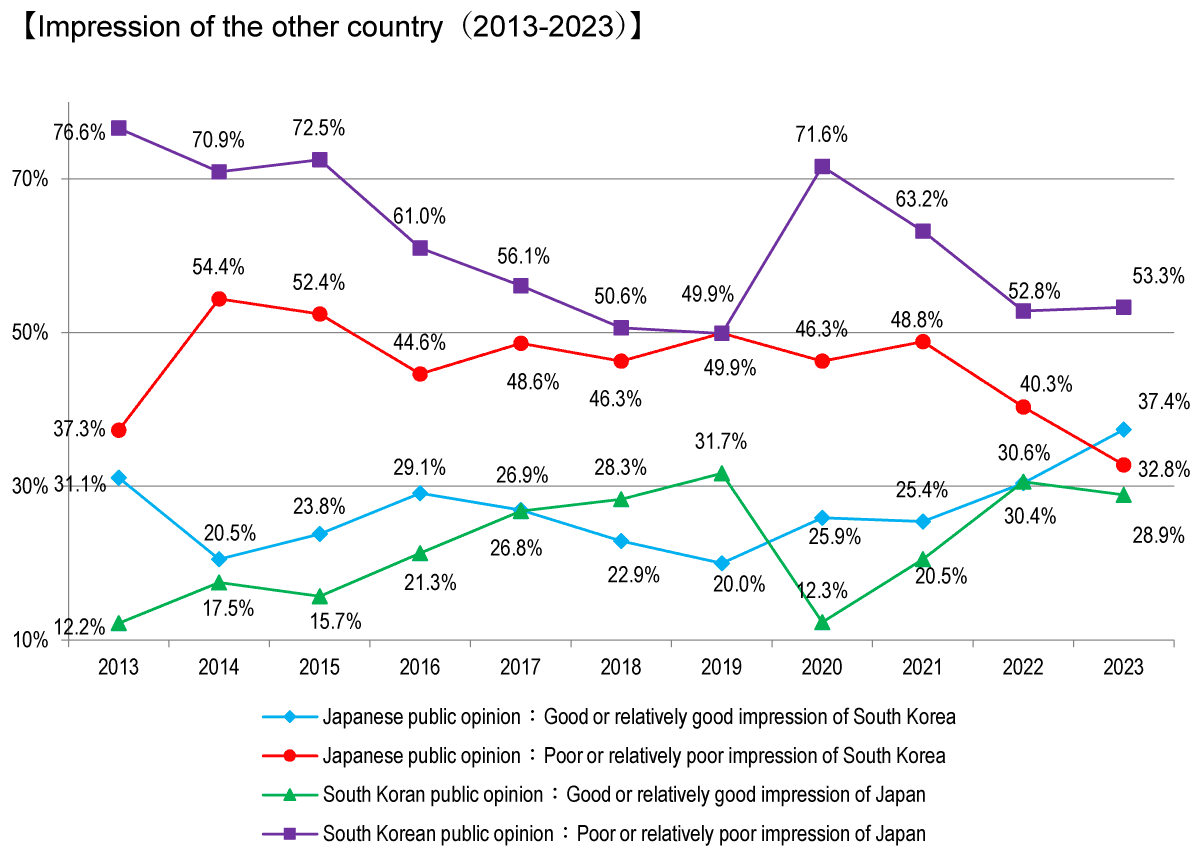
The survey data suggests that the reason South Korean respondents still have a poor impression of Prime Minister Kishida, even though he is promoting a better bilateral relationship, is because they still feel no real intention on his part to apologize.
The most commonly selected answer among South Korean respondents for the reason for their poor impression of Japan (at 65.4%) was that they believe Japan has not properly reflected on its history in regard to its invasion of the Korean Peninsula.
During his May visit to South Korea, Prime Minister Kishida addressed the historical conscripted of laborers with President Yoon by directly expressing his own feelings on the matter when he said, "It is heartbreaking that so many people suffered so much pain and sorrow under the harsh conditions of the time." However, this statement seems to have had little effect on South Korean opinion.
This is one reason Japanese impressions of South Korea have improved while South Korean impressions have not.
Moreover, our analyses of the responses showed a strong positive correlation between how people in each country evaluated national policies on improving the Japan-South Korea relationship and their feelings about the current and potential future relationship.
This survey showed that more Japanese rate South Korean government efforts to improve the relationship high than rate it low (34.8% versus 19.3%), while among South Korean respondents, 21.7% rate their government's efforts high and 32.3% rate them low.
In contrast, 34.5% of Japanese respondents approve of the Japanese government's efforts (with 16.2% disapproving), versus 15% of South Korean respondents approving of Japan's efforts and 34.2% disapproving.
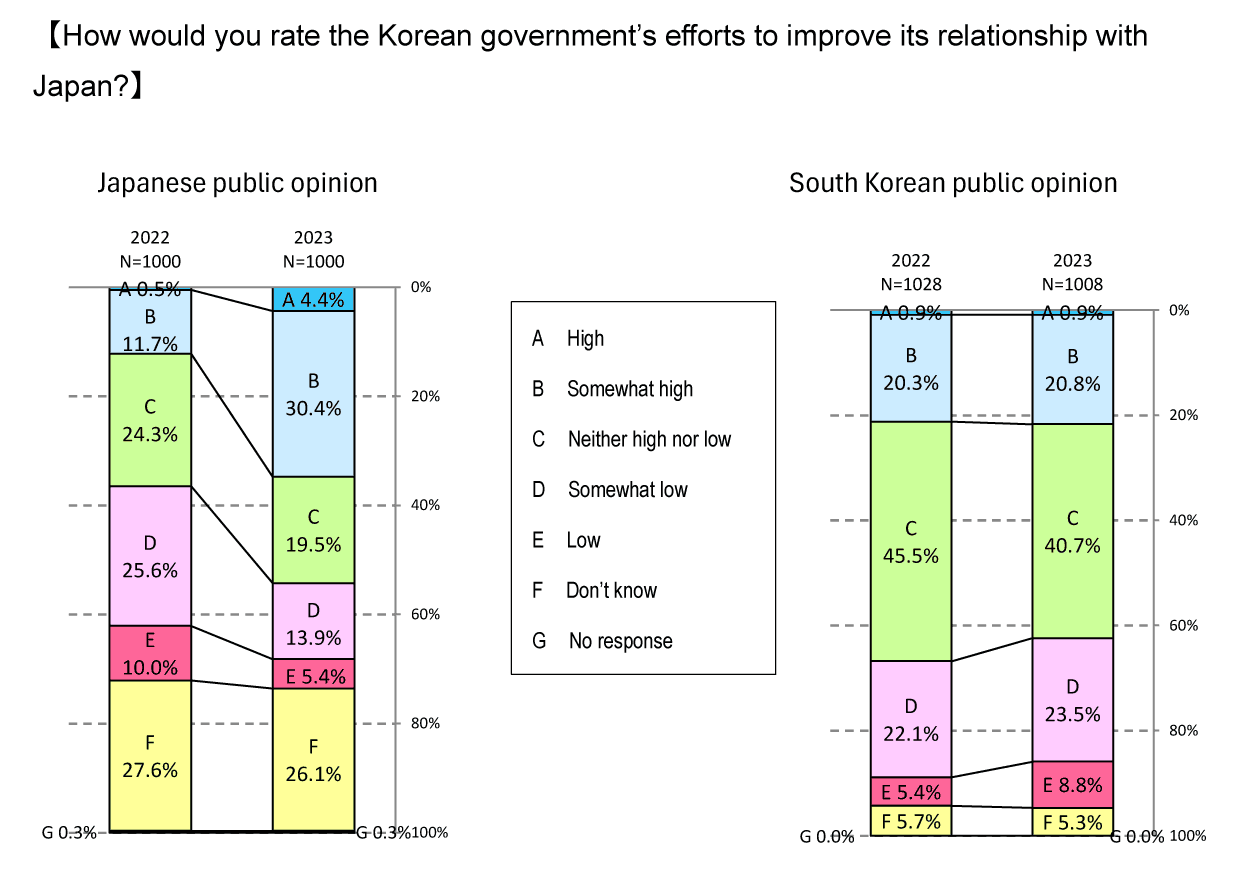
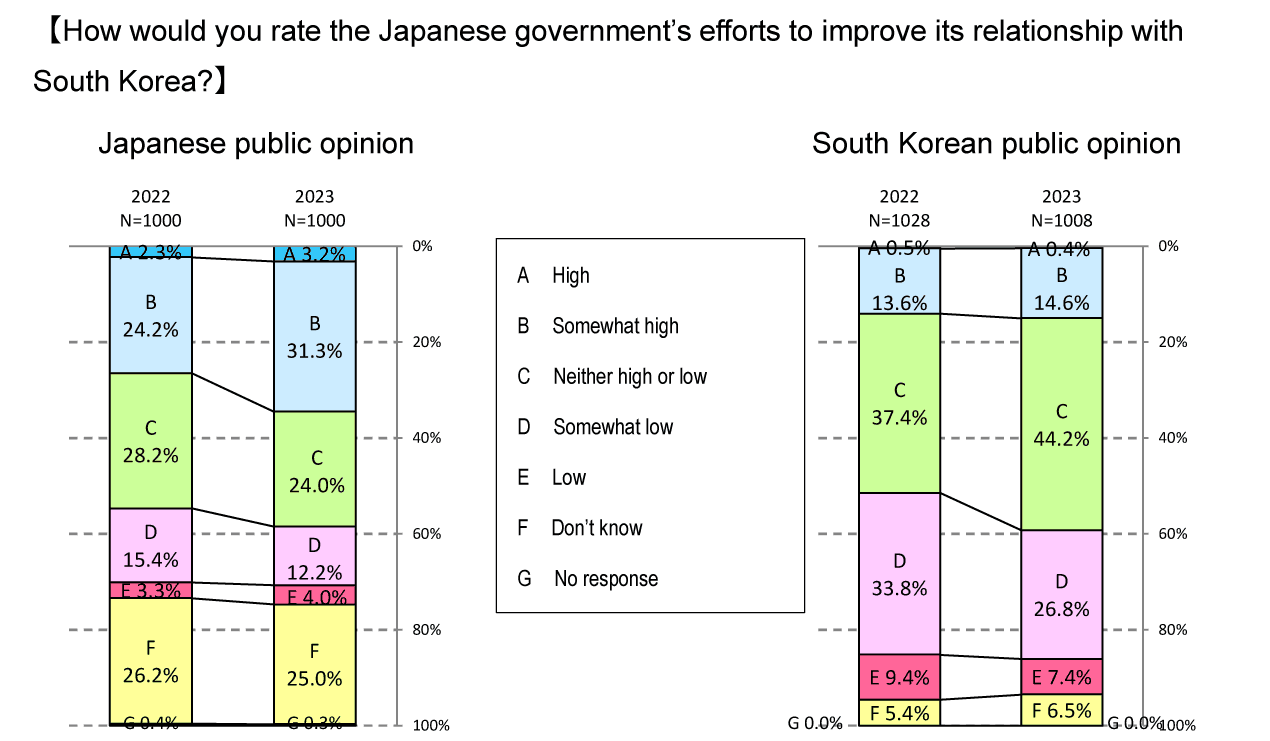
The high rating Japanese respondents give to both Japanese and South Korean policies has at least partially led to their high expectations for both the current and future relationship between the two countries. This stands in contrast to the opinion among South Korean respondents, whose low rating for the government efforts has led to their lower expectations for the current and future relationship.
A number of responses show that South Koreans are not satisfied with current policies.
The most commonly selected response (61%) regarding how to improve the Japan-South Korea relationship among South Koreans was that there needs to be a fundamental resolution of issues pertaining to historical awareness.
Although South Korean respondents do appreciate that the relationship is improving, they also believe that what has been achieved thus far is simply a patching of the issues that led to its deterioration, and that much work needs to be done to find a fundamental solution.
Survey participants were asked how the conflict between Japan and South Korea should be handled in the future, and in both countries (Japan at 42.8% and South Korea at 48.3%), the most commonly selected response was "Both sides should work to manage any conflict and prevent escalation."
Forming a new declaration, and differences in opinion about the release of treated water in Fukushima
A total of 61.8% of Japanese respondents still feel that the Japan-South Korea relationship is important, and while 74.1% of South Koreans feel the same, that is slightly lower than last year's 82.4%.
Worthy of note is that the percentage of South Koreans who feel the Japan-South Korea relationship (74.1%) is important is much higher than the number of Chinese respondents who feel the Japan-China relationship is important (only 60.1%).
The largest reason for the percentage drop among South Korean respondents is that 56.5% feel that historical issues remain unresolved, which makes it difficult to engage in any strong cooperation with Japan. This percentage has increased from 51.9% last year.
We see evidence of the importance people place on the relationship in people's opinions of recent efforts to improve it. However, we should focus on why the relationship is considered important, and there we find that people in both countries have similar opinions.
When asked why the Japan-South Korea relationship is important, we found that respondents share the same mind on more issues this year than they did last year.
First, 40.9% of Japanese respondents feel the relationship is important because the two countries have common security interests due to their shared status as US allies, a more than 10-point rise since last year (30.1%), while the percentage of South Korean respondents who selected this response has risen 5.4 points from 23.6% to 29% over the same period. In addition, while only 16.3% of Japanese and 13.3% of South Korean respondents agree with the idea that partners are needed to strengthen containment of China, that is an increase from 8.5% in Japan and 9.4% in South Korea last year.
That is not to say that people's ideas about the Japan-South Korea relationship are becoming more oriented towards the future.
As previously mentioned, October 10 was the 25th anniversary of the Japan-Republic of Korea Joint Declaration, which was created out of a desire to discuss how the relationship between the two countries should develop, and as a way to build a new partnership.
There is some movement towards formulating a new declaration, but regarding whether a new one should be made or not, Japanese respondents remain cautious when compared to the more proactive stance seen in South Korea.
In South Korea, 59% of respondents believe a new declaration should be formulated. In Japan, meanwhile, that number is only 30.9%, with 23.4% believing that the original joint declaration is sufficient. "Don't know" was selected by 45.5%.
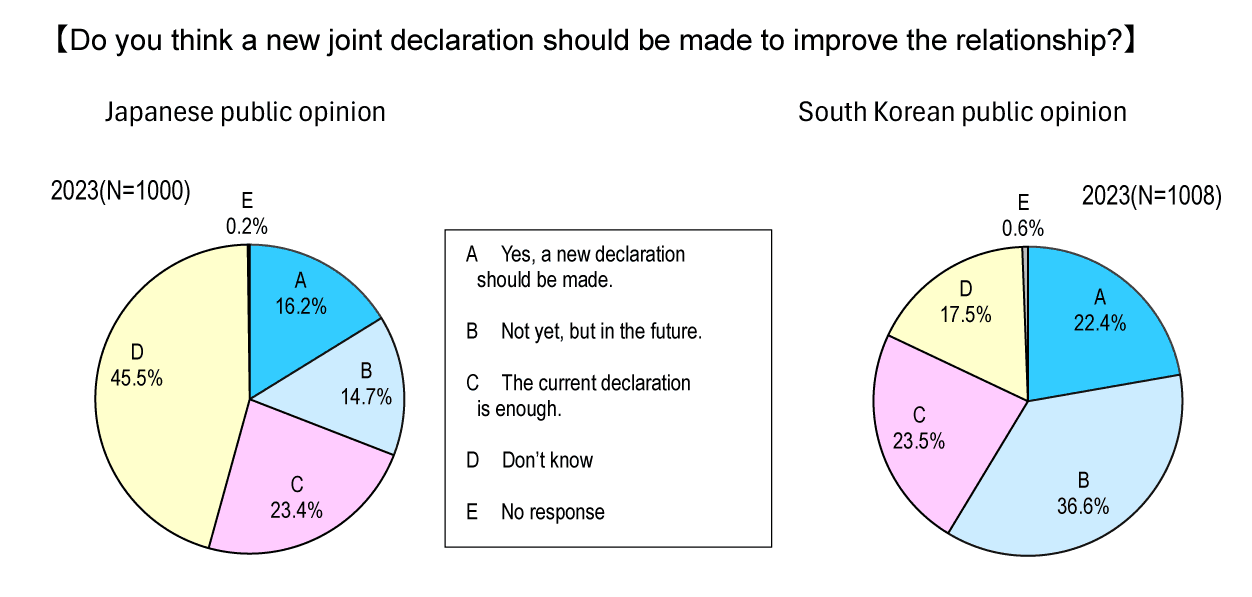
One reason for the difference in numbers here is in the difference in opinion regarding what should be included in such a declaration.
The most common answer in Japan was items related to building a future-oriented relationship at 37.9% (17.8% in South Korea), followed by items connected to making a joint effort to ensure peace and development in Asia at 23.6% (11.4% in South Korea).
In contrast, the most commonly selected answer in South Korea (at 22%) was that a new declaration would need to include references to Japanese remorse about and apologies for colonial rule (4.9% in Japan).
That lingering desire among South Koreans to seek out a more fundamental solution to historical issues is also connected to the backlash seen after treated water was released into the ocean from the Fukushima Daiichi Nuclear Power Plant.
The South Korean public had a much stronger reaction to that release than the Chinese public, which was discussed in a previous release.
The International Atomic Energy Agency (IAEA) confirmed that the release of water met international standards for safety, however, the most common response (at 39.1% in South Korea and 35.9% in China) addressing the release was that the IAEA's scientific review was irrelevant; treated water should not be released. The next most common response (at 29.6% in South Korea and 14.1% in China) was that the IAEA's scientific review is not reliable, so treated water should not be released.
In other words, almost 70% of South Korea respondents believe that there should have been no release of the water, much higher than the 50% of Chinese respondents who chose the same responses.
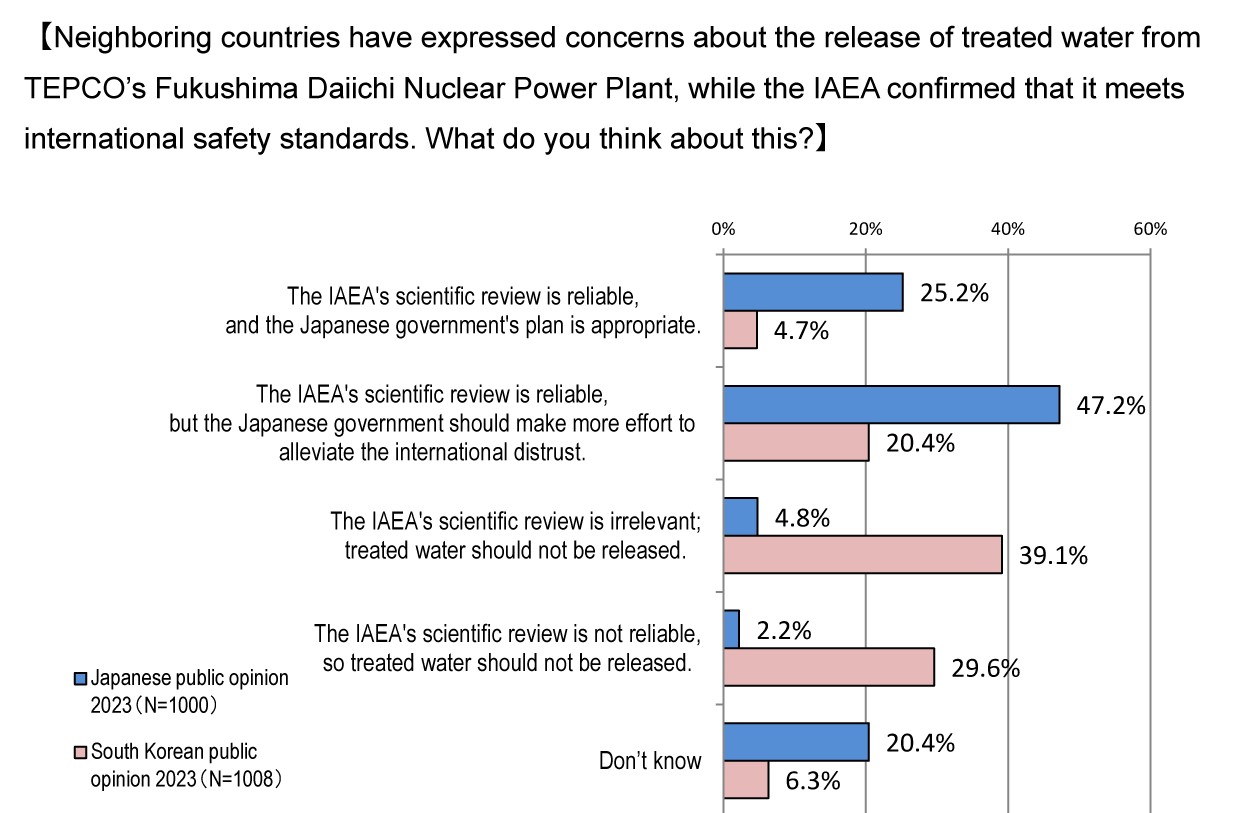
Differences in attitude regarding Japan-US-ROK military cooperation in response to the rising threat posed by North Korea and China
Next, we will discuss issues of national security.
This set of questions dealt with how Japan and South should deal with regional threats, e.g. the rise of China and North Korea's nuclear weapon and missile development programs.
The sudden rush to improve the Japan-South Korea relationship arose from their mutual goal to establish a system through which they could cooperate with their mutual ally, the US, and the US expected this effort to be made.
First, 76% of Japanese respondents and 69.2% of South Korean respondents believe that there are countries that are a military threat, and in Japan, the most commonly selected country was North Korea (80%) followed by China (68%). The same countries were selected by South Korean respondents, with North Korea at top with 89.7%, a 9.3-point rise over last year's 80.4%, and China following at 57.9%.
However, it is important to note that the third most commonly selected country for South Korean respondents was Japan at 28.9%. Only 5.8% of Japanese respondents see South Korea as a military threat.
Japan, the US, and South Korea have built a structure for joint military exercises and other cooperative efforts in response to the threat posed by North Korea's nuclear weapon and missile development programs, and 60.6% of South Korean respondents agree with these efforts, and though this is a drop from 72.4% in last year's survey, it remained the most commonly selected response. Almost half of Japanese respondents support the efforts (49.9%), a jump from 37.9% last year.
Such military cooperation between the three countries is supported by a majority of respondents in both Japan and South Korea, but almost the same percentage of Japanese respondents (46.7%) selected "Don't know" when asked if they support such efforts.
The most commonly selected response for why respondents support trilateral military cooperation was that it is considered essential for the denuclearization of North Korea and the stability of the Korean Peninsula, with 79.8% of Japanese respondents and 71.7% of South Korean respondents selecting this response.
In South Korea, the next most common reason was that it will help address the rise of China, with 57% selecting this, a rise from 51.7% last year. The third most common reason at 39.4% was that such cooperation strengthens the US-centered security framework in Northeast Asia, a rise of 19.5 points over last year's 19.9%.
Roughly 40% of Japanese respondents selected those same two answers, and unlike in the South Korean data, both have dropped slightly since last year.
On the other hand, in both countries, the most common reason selected by those who do not support the military cooperation was the fear that it would raise tensions on the Korean Peninsula, with this selected by 57.1% of such Japanese respondents and 60% in South Korea. In South Korea, 36.8% of those who do not support cooperation cited their inability to trust Japan due to historical issues.
When asked how Japan and South Korea should cooperate in responding to North Korea, the most common answer with 47.5% of Japanese respondents and 41.5% of South Korean respondents was information sharing regarding North Korea's military threat is necessary.
In South Korea, 20.5% are opposed to Japan and South Korea cooperating in security matters even in response to the North Korean nuclear threat (3.6% in Japan). Conversely, 19.6% (in Japan 13.9%) actually feel that cooperation should not be limited to only information-sharing, but rather that a new council for policy making should be established to allow for a joint response.
In both countries, many respondents believe that improving the relationship between Japan and North Korea will help stabilize the Korean Peninsula and improving the current situation in Northeast Asia, at 42.6% of Japanese and 43.4% of South Korean respondents. However, 33.3% of Japanese are neutral about this, alongside 31.7% of South Koreans, and roughly 20% of respondents in both countries feel that such an effort would not be useful.
Analyzing the relationship between a stronger US extended nuclear deterrence and South Korean opinion regarding nuclear weapons
Next we look into the issues revolving around the US extended nuclear deterrence.
Both Japan and South Korea have announced their support of the Washington Declaration, a plan to strengthen the US' extended deterrence to better respond to concerns about North Korea's nuclear weapons. We asked South Korean survey takers if they believe that the declaration will sufficiently resolve the country's security concerns, and asked Japanese survey takers whether the extended nuclear deterrence of the US will make Japan more secure.
First, 57.7% of South Koreans agreed that the declaration is effectively addressing South Korean national security concerns and is alleviating people's anxiety. Those who disagree with the declaration, i.e. those who believe it will not be useful, stood at 26.2%.
Among Japanese respondents, 44.1% believe that the US extended nuclear deterrence is functioning well, while 17.8% believe it is not. Meanwhile, of those who believe it to be functioning, only 2.9% responded that they "never doubted it" while 41.2% remain "concerned."
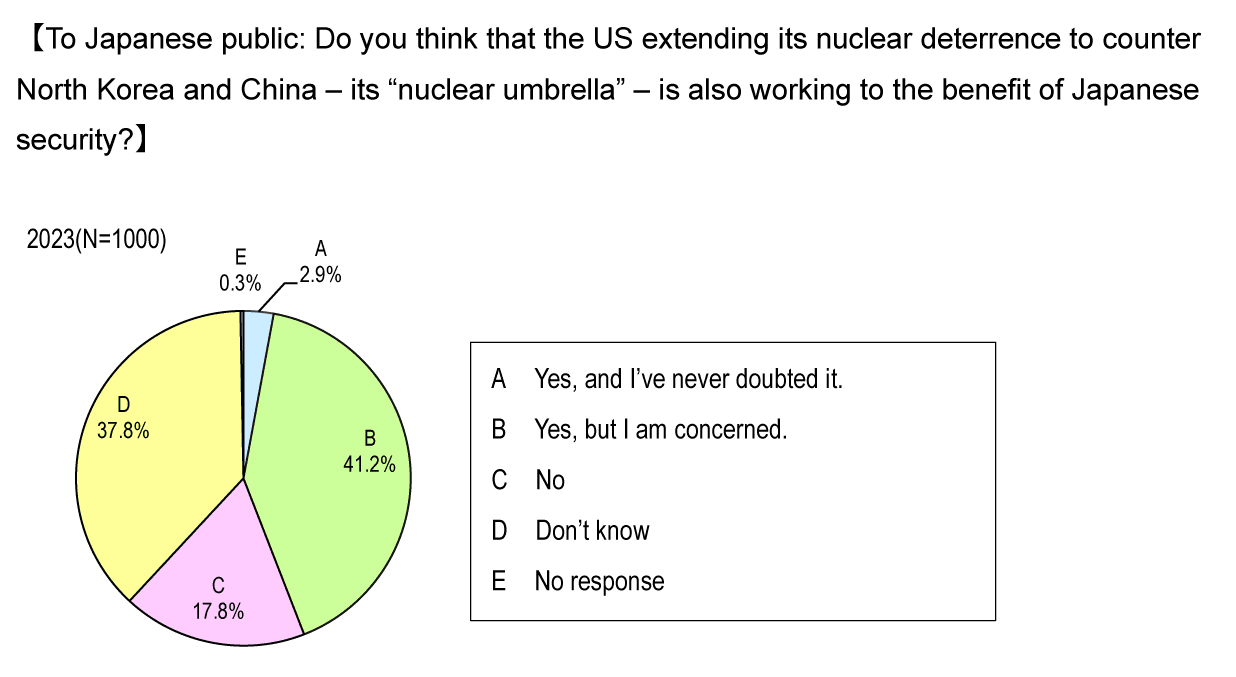
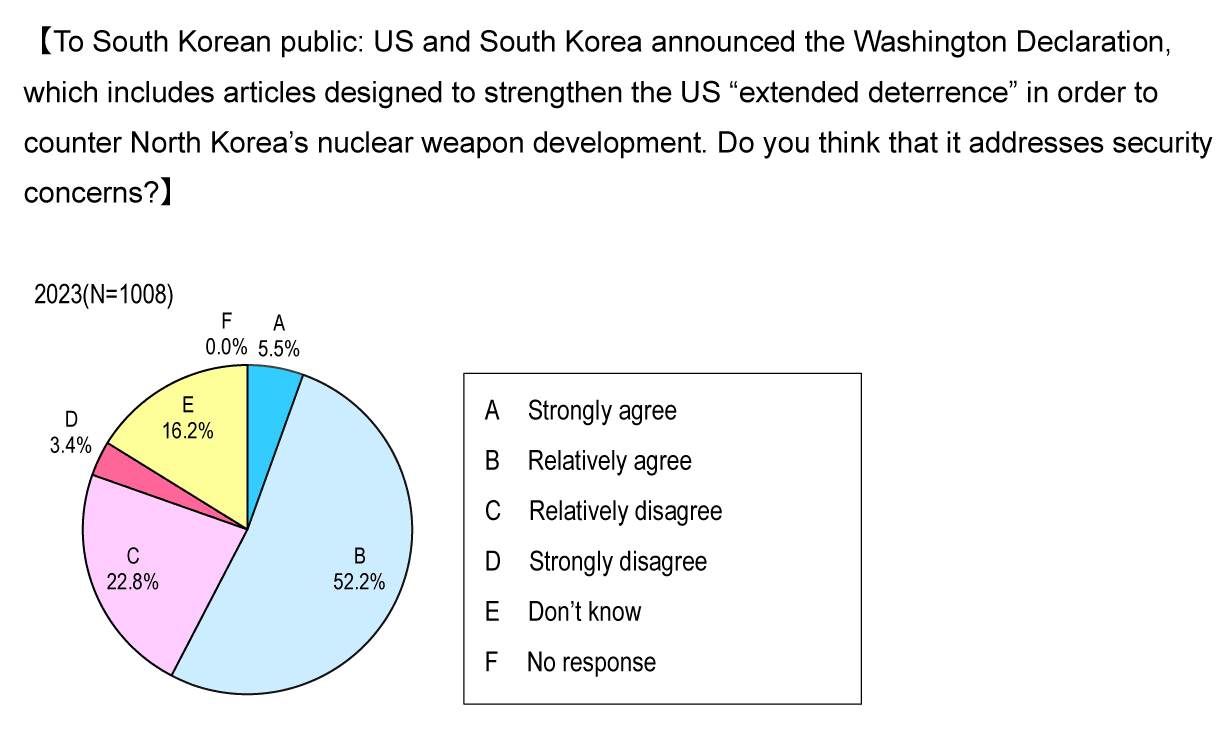
Next we asked respondents about the pros and cons of each country building its own nuclear arsenal in the case that North Korea continues to avoid denuclearization.
There was little change in the percentage of Japanese respondents who agree or disagree with Japan arming itself with nuclear weapons, with 14.4% for (from 14.6% last year) and 59.4% (61.6% last year) against.
In South Korea, the percentage who disagree with Japan becoming a nuclear power still stands 71.2% (down from 80.7% last year), but those who agree has almost doubled from 9.1% last year to 17.2%.
In contrast, 58.5% of South Koreans feel their country should arm itself with nuclear weapons. This has dropped from last year's 69.6%, but it shows that a majority are still in favor. Among Japanese survey takers, 10.2% support South Korea becoming a nuclear power (from 9.4% last year), and 61.4% are opposed (compared to 66.5% last year).
When we compare people's opinion of the Washington Declaration with their opinion of nuclear armament, we find that nearly 60% of South Koreans who believe the declaration has helped alleviate South Korean national security concerns also agree with the idea of South Korea becoming a nuclear power.
Our analysis revealed that 70.9% of those who fully agree with the Washington Declaration are in favor of nuclear weapons, as are 66.3% of those who somewhat agree.
This shows that the Washington Declaration is seen as providing effective extended nuclear deterrence, but there is still some domestic criticism about the fact that the declaration forced South Korea to abandon any plans of producing its own nuclear weapons.
Participants were asked their opinion of what the Korean Peninsula will look like in ten years, and 49.2% of Japanese respondents believe that it will either remain unchanged and unstable, or that the conflict between North and South Korea will worsen. The percentage who answered "Don't know" increased from 32.9% last year to 41.6%.
In South Korea, the percentage who feel the situation will stay the same or worsen has dropped from 58.5% last year to 49.3%, while 39.9% (up from 34%) believe that either the relationship will improve, or that steps towards reunification will be made.
Building a better relationship for the future through efforts today
Finally, we touch upon public opinion on the future of the Japan-South Korea relationship.
First, exchange and interaction between the people of the two countries is still insufficient, and people still lack a basic understanding of each other. For example, 45.4% of South Korean still view Japan as "militaristic," the most common answer selected when asked to describe their counterpart's culture and governance, followed by 42.1% selecting "capitalist." Only 27.9% of South Koreans describe Japan as "democratic," down from 31.5% last year.
This contrasts with the Japanese results describing South Korea, in which the most common answer was "democratic" at 50.3%, a large jump from 41.4% last year.
In order to build a better relationship between Japan and South Korea, it will be important to face the problems of the past directly, and that process is underway, but it is my belief that we will be unable to build a strong foundation for the future without increasing dialogue and exchange in various forms and gaining a better understanding of each other.
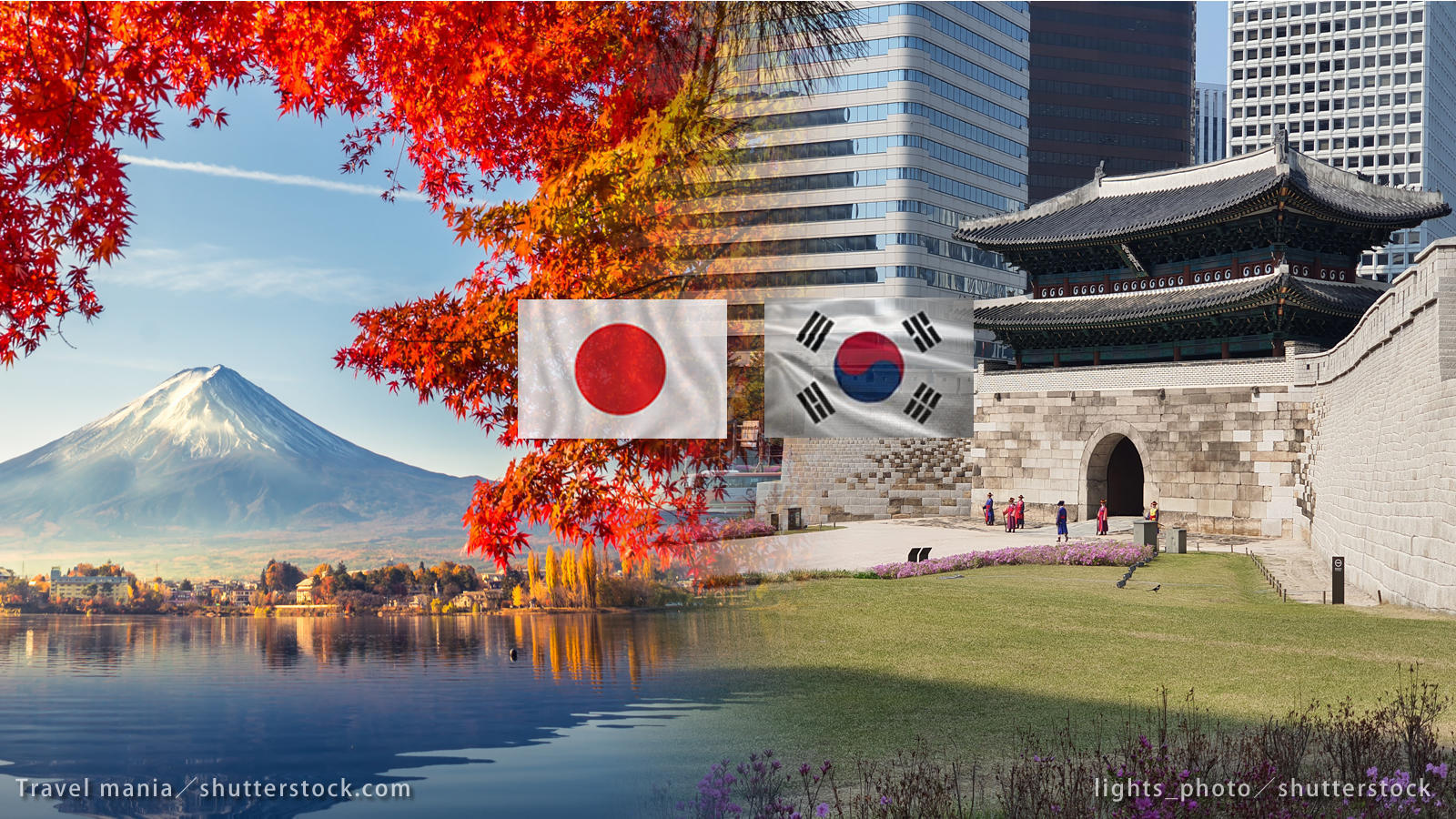
Post a comment